What to Do in a Mental Health Crisis?
Published: 24 Apr 2025
Every year, 1 in 8 people globally experience a mental health issue serious enough to disrupt daily life, and many don’t know how to respond when a crisis hits. (1)
Whether it’s overwhelming anxiety, suicidal thoughts, or complete emotional shutdown, knowing what to do in a mental health crisis can be life-saving.
By the end of this article, you’ll learn simple, actionable steps to stay safe, get help, and support someone else in crisis.
1- What Exactly Is a Mental Health Crisis? (And How to Know You’re in One)
A mental health crisis is a situation where a person’s mental health condition or situation poses a significant risk to their well-being or the well-being of others. This can manifest as actions, feelings, or behaviors that could lead to self-harm, harm to others, or an inability to care for oneself or function in the community. According to the World Health Organization (WHO),
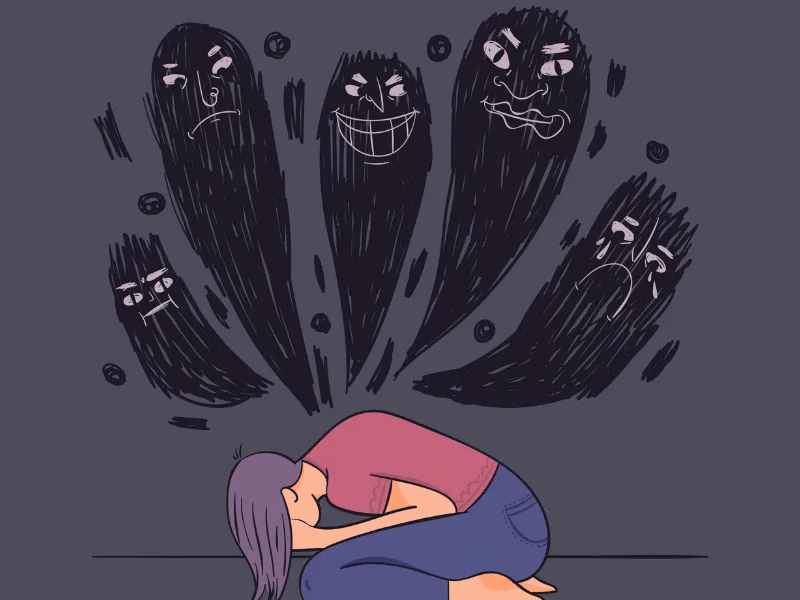
In simple words:
A mental health crisis is when you feel overwhelmed, unsafe, or out of control emotionally, mentally, or physically.
These moments can hit suddenly or build up over time. They can look different for everyone, but here are some common signs to watch for:
| Signs You Might Be in a Mental Health Crisis: |
|---|
|
Crisis doesn’t look the same for everyone. Trust what you feel.
If something feels too much or not right, it matters. You don’t need to wait for it to get worse.
Does this sound familiar? If even one of these feels true for you, don’t wait—keep reading. There’s help ahead.
2- What to Do in a Mental Health Crisis?
When your mind feels like it’s spinning or collapsing in on itself, you need simple, clear steps.
Let’s not overthink this. Here’s what to do immediately in a mental health crisis:

2.1 Are You Safe Right Now?
First things first, check your safety.
Ask yourself: Am I in danger? Am I safe to be alone?
If your answer is no or even “I’m not sure,” take action right now:
- Call for emergency help.
In the U.S., dial 911.
In the UK, call 999.
You can also use your country’s suicide prevention hotline.
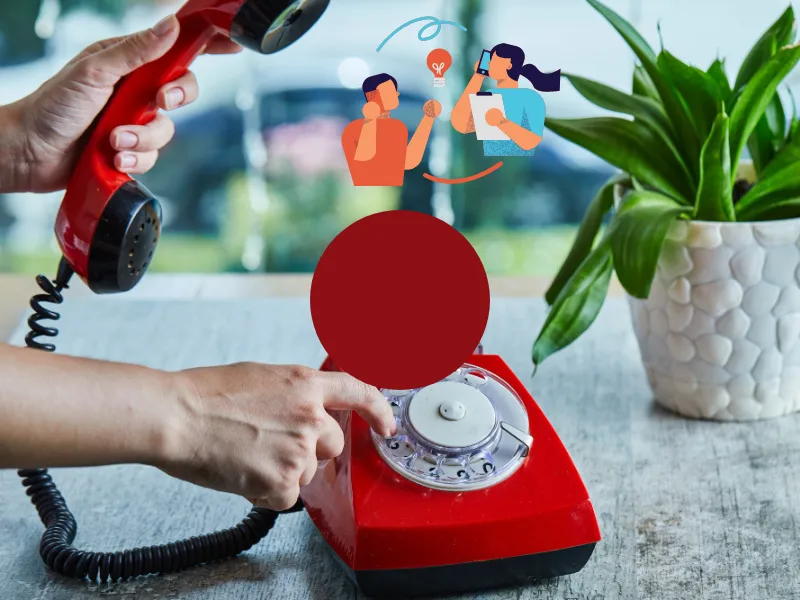
- Go to a hospital or a safe place nearby.
Even just sitting in a public space like a pharmacy or café can help for the moment.
2.2 Ground Yourself: Simple Steps That Help
When your mind feels chaotic, bring yourself back to the present moment. Try these quick grounding tools:
- The 5-4-3-2-1 Method
👉 Name 5 things you can see
👉 4 things you can touch
👉 3 things you can hear
👉 2 things you can smell
👉 1 thing you can taste (2)
(This helps reconnect your brain to your body.) - Breathe slowly
Inhale for 4 seconds… hold… exhale for 6 seconds.
Repeat this for a minute. It actually calms your nervous system.

- Splash cold water on your face
It shocks the system gently and helps reset your mind.
Try one of these grounding steps right now. Even if it feels small, it’s a step toward calm.
2.3 Reach Out
You don’t have to do this alone; talk to someone.
- Call a friend or family member you trust
You don’t need to say much. Just, “Hey, I’m not okay right now.”

- Use mental health helplines or chat support
There are people trained to help you through this. - Text “HELLO” to 741741 (U.S. Crisis Text Line)
You’ll connect with a trained crisis counsellor, completely free and confidential.
Still not sure who to call? You’ll find a list of real, free resources below—just scroll down.
3. Who Can Help You During a Crisis?
When everything feels too heavy to carry, you don’t have to hold it all alone. The right help can make all the difference, and yes, it’s okay to ask for it. Let’s break it down simply.
3.1 Mental Health Professionals
These are the experts trained to help you feel better and safer:
- Therapists (talk therapy, coping strategies)
- Psychiatrists can prescribe medications and assess deeper mental health issues.

In my experience as a medical student, even one good session with the right therapist can help someone feel a bit lighter. Sometimes that’s the first big step.
3.2 Emergency Responders
If it’s an immediate danger situation:
- Call an ambulance or go to the emergency room
- In many places, police are trained in crisis intervention, but they always say it’s a mental health emergency, so they respond with care

3.3 Family, Friends & Peer Support
Don’t underestimate your circle:
- A trusted friend or sibling can sit with you, call someone on your behalf, or just listen
- Peer support groups, especially online, can connect you with people who’ve been there too

“I didn’t want to talk to a doctor, but texting my best friend saved my life. She just stayed on the phone until I calmed down.” — (from Reddit)
| 4. Mental Health Crisis: 3 Common Mistakes You Should Avoid |
|---|
When you’re in the middle of a mental health crisis, it’s easy to get overwhelmed and do things that may feel like they’ll help in the short term but can make things worse. Let’s break down what to avoid in these moments. 4.1 Don’t Isolate YourselfIt might feel easier to shut yourself off from the world, but isolating yourself can make the crisis harder to handle. 
4.2 Don’t Rely Only on Substances (Alcohol, Drugs)It’s tempting to numb the pain with alcohol or drugs, but these don’t fix the problem. They might make things feel okay for a little while, but they often make things worse in the long run. Instead, try grounding techniques, reaching out for support, or simply breathing. 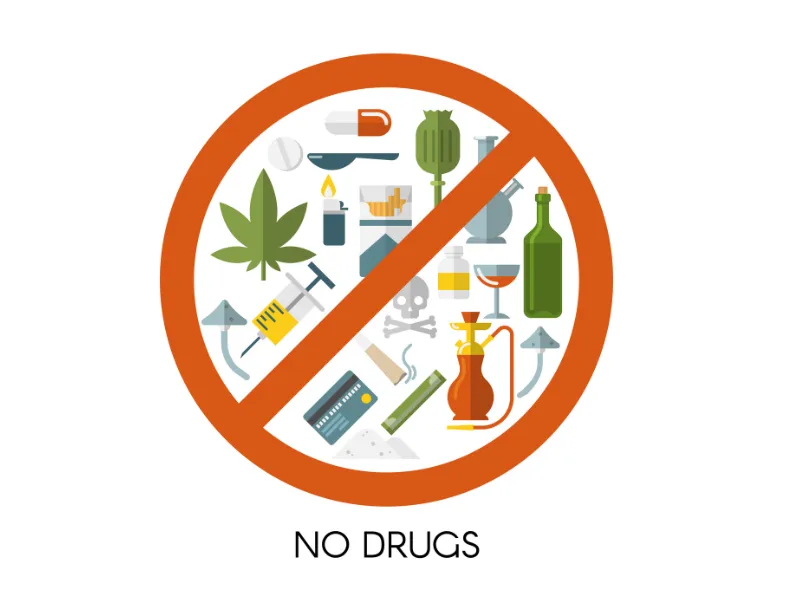 4.3 Don’t Make Major Life Decisions Right NowA mental health crisis is not the best time to make huge decisions about your future, like quitting your job, ending a relationship, or moving cities.  Take a pause. Decisions made in a heightened emotional state often feel wrong later. Take time to think things through with support from someone you trust. |
If you’ve done some of these things before, that’s okay. Now you know better and you’ve already taken the first step by reading this.
5- How to Help Someone in a Mental Health Crisis Without Saying the Wrong Thing
If someone you care about is going through a mental health crisis, your support can make a huge difference. Here’s how you can help them calmly and effectively:
5.1 Stay Calm and Listen
When someone is in a crisis, they need someone to listen without judgment.
Listen actively, nod, make eye contact, and be present. Sometimes, just knowing that someone is there to hear them can bring a sense of relief.
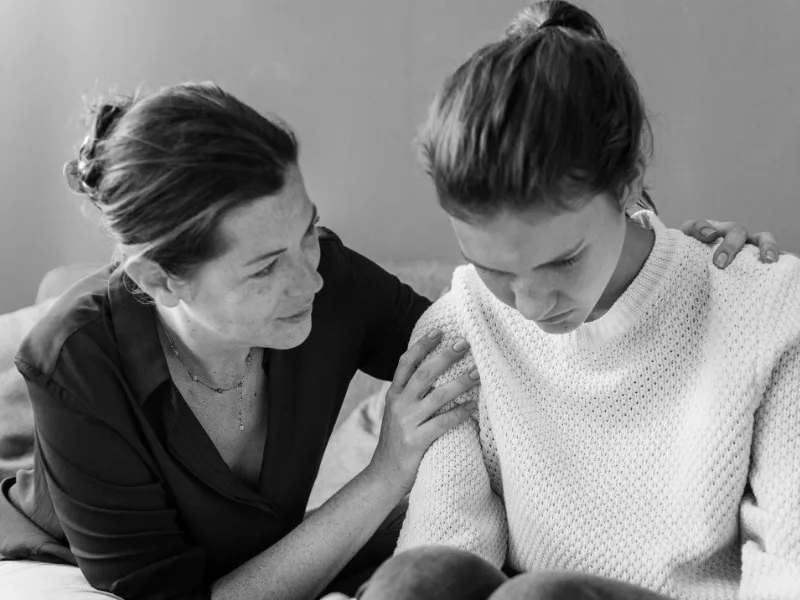
5.2 Ask: “Are You Thinking of Hurting Yourself?”
It can be hard to ask direct questions about self-harm or suicide, but it’s better to ask than to avoid it.
Be honest and straightforward. This lets them know you are open to talking about difficult feelings. If they are at risk, it’s essential to get help immediately.
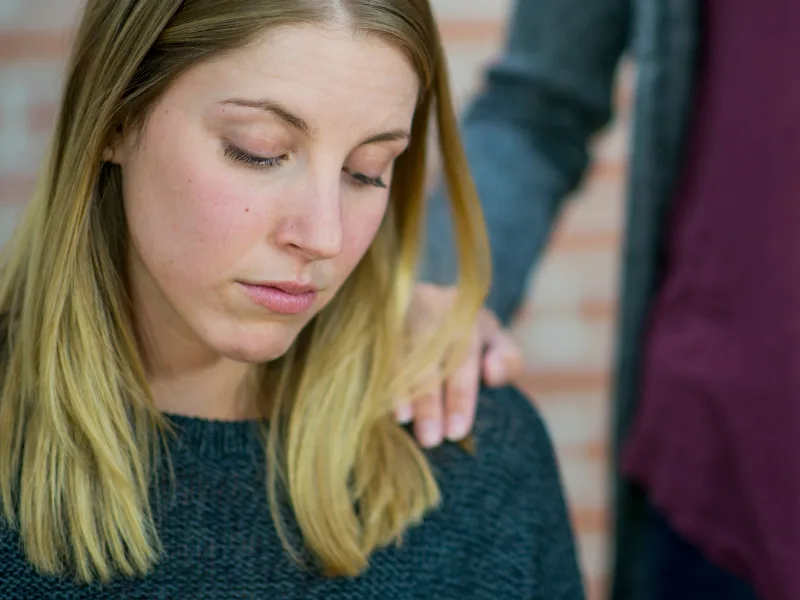
5.3 Help Them Contact a Professional or Drive Them to Help
If they are open to it, help them reach out to a mental health professional or take them to a hospital or crisis centre.
Offer to drive them or help them find a helpline. You don’t have to do this alone, some professionals can guide you both.
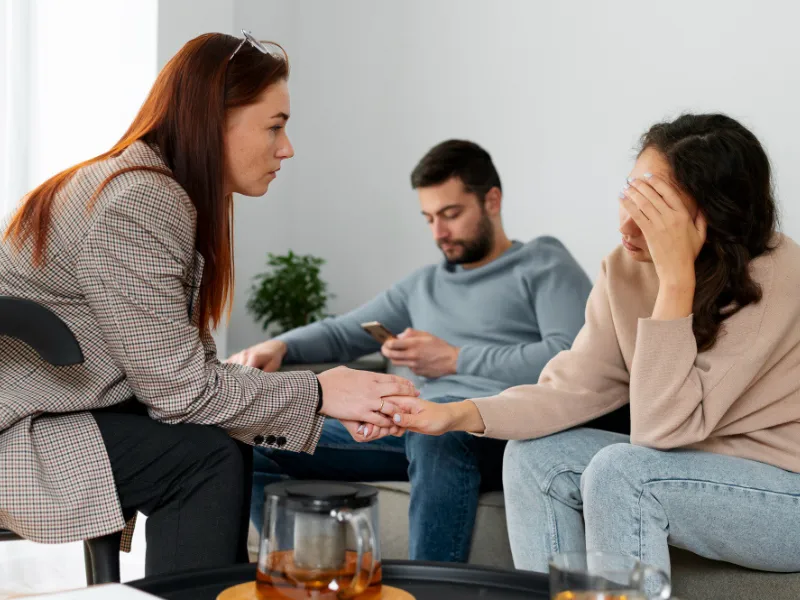
5.4 Avoid Judging, Giving Too Much Advice, or Saying “Just Relax”
In moments of crisis, people need compassion, not solutions or advice.
Don’t dismiss their feelings or try to “fix” things right away. Phrases like “just relax” or “snap out of it” can feel invalidating and unhelpful.

5.5 Things NOT to Say:
- “Snap out of it.”
- “You’re overreacting.”
- “Just think positive!”
- “It’s not a big deal.”
- “You have so much to be grateful for, why are you upset?”
Instead, focus on understanding and offering practical support. Your presence is powerful.
Know someone struggling? Share this article, it might be the lifeline they never told you they needed.
6- After the Crisis: What Next?
Once things calm down, it’s time to focus on recovery and staying steady. Here’s what really helps:
6.1 Make a Crisis Plan
Write down:
- Your triggers (things that set you off)
- Steps that help (like deep breathing or calling someone)
- Emergency contacts (therapist, friend, hotline)
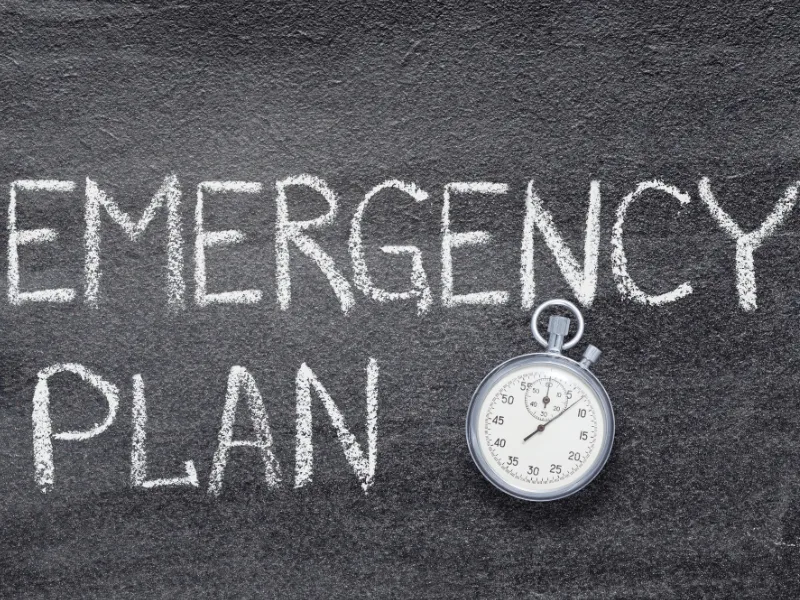
6.2 Stick with Therapy
If you’re in therapy, keep going. If not, this is a great time to start. A therapist can help you understand your feelings and stay on track.

6.3 Tweak Your Daily Routine
Add in small breaks. Sleep enough. Avoid things that pile on stress. Even tiny changes can make a big difference.

Talk About It
Talking helps heal. Open up to a friend, therapist, or support group.
I once shared my own panic episode, and it made others feel safe to share too.
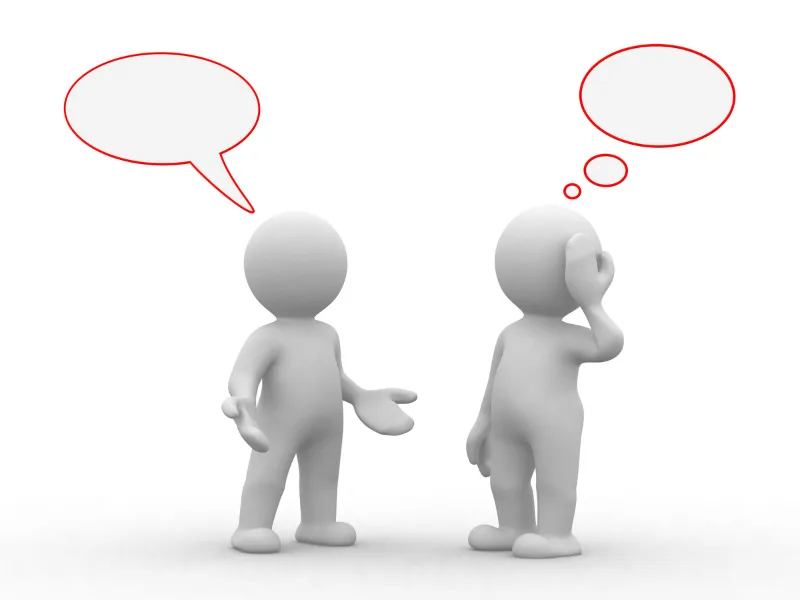
You don’t need to “bounce back” fast. Healing takes time; go easy on yourself.
7- Real-Life Stories & Perspectives
Let’s look at what real people shared about navigating situations:
1. ER Visits Sometimes Fall Short
One user shared how they took a loved one to the ER after a terrifying episode. Doctors did a full physical check, even brain scans. Psychiatrists saw the patient, gave anti-anxiety meds, and sent them home.
“They seemed okay for a few hours, but by evening, the psychosis was back. We couldn’t reach the outpatient program they referred us to. It felt like a dead end.”
ERs often stabilise patients temporarily but aren’t always equipped for ongoing psychiatric crises. Families need clear follow-up plans and responsive services.
7.2 Try Psychiatric Urgent Care or Mid-Sized Hospitals
A few users recommended places that did help:
- Sheppard Pratt’s Psychiatric Urgent Care
“They were amazing. Helped my relative get admitted when others turned us away.” - Dominion Hospital, Falls Church
“They have a 24/7 intake line and were the best experience I’ve had.” - Sibley Memorial Hospital (DC)
“They only take voluntary patients, but the environment is supportive, not chaotic.”
If needed, advocate fiercely and use phrases like “unsafe discharge” to stress the seriousness.
7.3 When People Refuse Help, It Gets Heartbreaking
Another user shared a sad story about their neighbour:
“She was brilliant, PhD, high-ranking job. But after a head injury and some trauma, she spiralled. Now she talks to herself at the bus stop. Her family tried everything, but she refused treatment.”
Mental illness can strip someone of everything. When they refuse care, families feel helpless. Laws in many places don’t allow forced treatment unless the person is a danger.
8- Quiz: Would You Know What to Do in a Mental Health Crisis?
1. What’s the first step when you feel a panic attack coming on?
- A) Try to ignore it
- B) Take slow, deep breaths (4 seconds in, 6 out)
- C) Call someone immediately
- D) Go to bed and rest
Correct Answer: B – Take slow, deep breaths (4 seconds in, 6 out)
2. If someone is in immediate danger during a mental health crisis, what should you do?
- A) Ignore the situation and let them calm down
- B) Call emergency services (911 or local emergency number)
- C) Offer them advice on how to manage it alone
- D) Give them alcohol or drugs to help calm down
Correct Answer: B – Call emergency services (911 or local emergency number)
3. When supporting someone in a mental health crisis, what is the most important thing to do?
- A) Offer a solution to their problem
- B) Listen calmly and offer your presence without judgment
- C) Tell them to “snap out of it”
- D) Ask them to take a break and not talk about their feelings
Correct Answer: B – Listen calmly and offer your presence without judgment
4. If you’re experiencing a mental health crisis, what should you do first?
- A) Isolate yourself from everyone
- B) Find a quiet space and practice grounding techniques
- C) Make major life decisions to distract yourself
- D) Wait until it passes on its own
Correct Answer: B – Find a quiet space and practice grounding techniques
5. Who should you contact if you feel overwhelmed during a mental health crisis?
- A) A family member or close friend you trust
- B) A mental health hotline or therapist
- C) Both A and B
- D) No one, just handle it yourself
Correct Answer: C – Both A and B (A family member or close friend, and a mental health hotline or therapist)
Quiz Results & Next Steps:
- 4-5 Correct Answers: Great job! You’re well-prepared to handle mental health crises, but there’s always more to learn. Consider exploring professional resources or brushing up on emergency contact numbers.
- 2-3 Correct Answers: You’re on the right track! Take a moment to review crisis support steps and consider learning more about mental health resources.
- 0-1 Correct Answers: Don’t worry, it’s okay to not know everything. We recommend reading more about how to handle mental health crises and saving important emergency numbers. Check out our resources below.
Next Steps:
- Explore more mental health resources and hotlines [List of Crisis Hotlines Worldwide].
- Learn grounding techniques and other crisis management strategies in our detailed blog section.
- Share your quiz score in the comments below! What did you learn about mental health crises?
Curious to learn more? Check out our next article on
9- Conclusion: What to Do in a Mental Health Crisis?
So, guys, in this article, we’ve covered the question, “What to Do in a Mental Health Crisis?” in detail. It’s crucial to stay calm, assess your safety, and seek immediate support when needed.
From personal experience, I’ve learned that the sooner you reach out, the better the chances of getting the right help. I encourage you to create a crisis plan now, so you’re prepared if ever needed.
If you’re in crisis right now, take a moment to reach out to someone or contact a helpline. Your well-being matters.
Found this helpful? Share it with your friends and drop a comment below if you have any questions.
10- FAQs: What to Do in a Mental Health Crisis?
If someone is having a mental breakdown, stay calm and supportive. Encourage them to breathe slowly and create a safe, quiet space. If needed, help them get professional support.
Instead of calling the police, you can contact mental health hotlines, like the National Suicide Prevention Lifeline (1-800-273-8255) in the U.S., or a local crisis intervention service. Many areas have trained professionals who can assist.
Stay calm and listen without judgment. Offer support by asking how they feel and help them contact a professional or seek a safe space. Avoid offering solutions or advice that might seem dismissive.
The first steps include ensuring your safety, grounding yourself (or the person), and reaching out to someone you trust. If necessary, call a mental health hotline or go to a safe space for help.
In the U.S., the National Suicide Prevention Lifeline is available at 1-800-273-TALK (8255). There are similar hotlines in other countries, such as Lifeline in Australia (13 11 14) and Samaritans in the UK (116 123).
Symptoms of a mental breakdown include intense emotional distress, feelings of hopelessness, difficulty functioning, panic attacks, and overwhelming sadness or anxiety. If you’re experiencing these, it’s important to seek help.
If you feel overwhelmed, unsafe, or out of control emotionally, mentally, or physically, you might be experiencing a crisis. Take a moment to assess your feelings—if you’re struggling, reach out for support.
You can call mental health hotlines, a therapist, or a crisis intervention team. In urgent situations, you may need to call an emergency number for immediate help.
Examples include severe panic attacks, suicidal thoughts, psychotic episodes, or self-harm behaviors. Any situation where someone feels overwhelmed and unsafe mentally or emotionally can be considered a crisis.
Don’t isolate yourself, avoid making big decisions, and don’t rely on substances like alcohol or drugs. It’s also important to avoid minimizing the situation or telling someone to “just relax.”
11- References
At MedicaWire, all medically sensitive content is reviewed by licensed healthcare professionals. Our team ensures that the information you read is accurate, up-to-date, and based on trusted medical sources.
Learn how we maintain high standards by reading our Editorial Policy.
📚 Sources
1- WHO
https://www.who.int/health-topics/mental-health
2- University of Rochester Medical Centre– 5-4-3-2-1 Coping Technique for Anxiety
https://www.urmc.rochester.edu/behavioral-health-partners/bhp-blog/april-2018/5-4-3-2-1-coping-technique-for-anxiety
3- Hudson E, Pariseau-Legault P, Cassivi C, Chouinard C, Goulet MH. Mental Health Crisis: An Evolutionary Concept Analysis. Int J Ment Health Nurs. 2024 Dec;33(6):1908-1920. doi: 10.1111/inm.13412. Epub 2024 Aug 29. PMID: 39210690.
https://pubmed.ncbi.nlm.nih.gov/39210690
4- Shalit, B., & Gettas, M. (2020). Mental Health Crisis: Depression, Anxiety, and COVID-19. Delaware Journal of Public Health, 6(2), 44.https://doi.org/10.32481/djph.2020.07.013
https://pmc.ncbi.nlm.nih.gov/articles/PMC8389816/
5- Cassivi C, Sergerie-Richard S, Saint-Pierre B, Goulet MH. Crisis plans in mental health: A scoping review. Int J Ment Health Nurs. 2023 Oct;32(5):1259-1273. doi: 10.1111/inm.13158. Epub 2023 Apr 26. PMID: 37098744.
https://pubmed.ncbi.nlm.nih.gov/37098744
6- Aftab A, Druss BG. Addressing the Mental Health Crisis in Youth-Sick Individuals or Sick Societies? JAMA Psychiatry. 2023 Sep 1;80(9):863-864. doi: 10.1001/jamapsychiatry.2023.1298. PMID: 37342020.
https://pubmed.ncbi.nlm.nih.gov/37342020
ℹ️ Our Promise
MedicaWire follows strict sourcing guidelines and only references peer-reviewed studies, academic institutions, and reputable medical associations. We update content regularly to reflect new health information.

- Be Respectful
- Stay Relevant
- Stay Positive
- True Feedback
- Encourage Discussion
- Avoid Spamming
- No Fake News
- Don't Copy-Paste
- No Personal Attacks



- Be Respectful
- Stay Relevant
- Stay Positive
- True Feedback
- Encourage Discussion
- Avoid Spamming
- No Fake News
- Don't Copy-Paste
- No Personal Attacks




